Introduction
The world is witnessing a profound transformation in the way social and environmental challenges are addressed. This transformation is the result of the convergence of impact investing and technology for social good. Impact investing, a financial approach that seeks to generate both financial returns and positive social or environmental outcomes, has gained momentum in recent years. Simultaneously, technology has become a powerful catalyst for addressing critical societal issues. This article explores the intersection of impact investing and technology, highlighting how this convergence is shaping a brighter future for social good.
The Convergence of Impact Investing and Technology
The convergence of impact investing and technology represents a dynamic synergy. Impact investing provides the financial impetus to drive positive change, while technology equips these investments with the tools and solutions necessary to create a meaningful impact. This union is essential for addressing complex global issues such as poverty, healthcare access, education, environmental sustainability, and more.
Impact investing, with its focus on creating both financial returns and positive outcomes, inherently seeks to solve social problems. Technology acts as a catalyst, providing the means to scale and optimize solutions, reach underserved populations, and measure the impact of investments accurately.
The key elements of this convergence include:
- Digital Platforms: Online platforms and apps make it easier for impact investors to discover, evaluate, and invest in projects or ventures that align with their social or environmental goals.
- Data and Analytics: Technology enables better data collection and analysis, facilitating the measurement and reporting of impact outcomes. This transparency is crucial for both investors and stakeholders.
- Scaling Impact Ventures: Technology can help impact ventures scale their operations and reach more beneficiaries. This includes improving operational efficiency and expanding access to services or products.
- Blockchain for Transparency: Blockchain technology can enhance transparency in supply chains and financial transactions, ensuring that investments have the desired impact.
- Innovative Solutions: Technology-driven innovations are solving long-standing social challenges, from mobile healthcare apps to affordable clean energy solutions.
What is Impact Investing?
Impact investing is a financial approach that goes beyond traditional investments. It aims to achieve both financial returns and positive social or environmental outcomes. Unlike purely profit-driven investments, impact investing places a strong emphasis on creating measurable, beneficial impacts.
Key characteristics of impact investing include:
- Intentionality: Impact investments are made with the explicit intention of creating a positive impact. The investor’s primary goal is to address specific social or environmental issues.
- Measurability: Impact investments are assessed using specific metrics and frameworks to evaluate their real-world impact. This measurement is essential for transparency and accountability.
- Profitability: Impact investments are expected to generate financial returns, ensuring that the investor’s capital remains sustainable and can be reinvested to create further positive impact.
- Alignment with Values: Impact investments align with the values and ethics of investors who want to ensure their financial choices reflect their social or environmental goals.
How Technology is Driving Social Good
Technology has become a driving force for social good by enabling innovative solutions and expanding the reach of impact initiatives. Here are ways in which technology is making a difference:
1. Access to Education
Technology is breaking down barriers to education. Online learning platforms, like Khan Academy and Coursera, provide accessible and affordable educational resources to people worldwide. This is especially critical for those in underserved or remote areas where traditional education is limited.
2. Healthcare Innovation
Mobile health applications and telemedicine are improving healthcare access. These technologies offer diagnosis, treatment, and medical advice remotely, benefiting people who lack easy access to healthcare facilities. Additionally, wearables and health monitoring apps empower individuals to take control of their health.
3. Financial Inclusion
Fintech solutions are increasing financial inclusion. Mobile banking and digital payment systems provide access to financial services for the unbanked and underbanked populations, supporting economic growth and stability.
4. Environmental Sustainability
Clean energy technologies, such as solar panels and wind turbines, are advancing the shift to renewable energy sources. Smart grids and energy management systems enhance energy efficiency. Additionally, data analytics and monitoring technologies help manage and conserve resources.
5. Humanitarian Aid
In times of crisis or disaster, technology plays a crucial role in humanitarian efforts. Drones are used for disaster assessment, and blockchain technology is employed for transparent aid distribution, ensuring resources reach those in need.
6. Sustainable Agriculture
Technology is driving sustainable agriculture through precision farming, remote monitoring of crops, and the use of data to optimize agricultural practices. This results in increased crop yields, reduced resource consumption, and improved food security.
Read more: Impact Investing and the UN Sustainable Development Goals (SDGs)
7. Clean Water Access
Technological innovations in water purification and distribution are improving access to clean water. Water purification systems, water quality monitoring, and water-saving technologies are essential for addressing water-related challenges.
Impact Investing Through Technology: Success Stories
Several success stories highlight the powerful impact of the convergence of impact investing and technology:
1. M-Pesa: Mobile Money in Africa
M-Pesa, a mobile-based financial service in Kenya, has transformed the way people access and manage their finances. It enables users to send and receive money, pay bills, and access banking services through their mobile phones. This innovation has significantly improved financial inclusion in Kenya and other African countries.
2. Solar Sister: Women in Clean Energy
Solar Sister is an organization that empowers women in sub-Saharan Africa to become clean energy entrepreneurs. Through a network of women-led enterprises, they provide access to affordable and clean energy solutions, such as solar lanterns and stoves. The use of technology, including mobile payments and digital inventory management, has played a pivotal role in scaling this initiative.
3. Zipline: Medical Drone Deliveries
Zipline, a company based in Rwanda, uses autonomous drones to deliver medical supplies to remote and inaccessible areas. These deliveries have been crucial in providing lifesaving medications, vaccines, and blood transfusions to people in need.
4. Impact Investment in Renewable Energy
Investments in renewable energy projects, such as wind and solar farms, have not only contributed to reducing carbon emissions but have also generated attractive financial returns for investors. This demonstrates the potential for aligning financial interests with environmental impact.
5. Blockchain for Transparent Supply Chains
Blockchain technology is being used to create transparent supply chains for products like diamonds, coffee, and seafood. This ensures that products are ethically sourced and traded, benefiting both consumers and producers.
These success stories showcase the tangible impact of technology-enabled impact investments. They illustrate how technology can be a force for social good, addressing diverse global challenges while delivering financial sustainability.
Challenges and Concerns
While the convergence of impact investing and technology offers immense potential, it also presents challenges and concerns:
1. Digital Divide
The digital divide remains a significant barrier to technology-driven social good. Not everyone has equal access to digital tools and the internet. This disparity must be addressed to ensure that technological innovations benefit all.
2. Data Privacy and Security
The collection and use of data for social good must be done with strict adherence to privacy and security principles. Ensuring the protection of sensitive data is crucial to building trust among stakeholders.
3. Technological Innovation
The rapid pace of technological innovation can lead to the obsolescence of existing solutions. Impact investments must remain flexible and adaptable to incorporate emerging technologies effectively.
4. Ethical Considerations
Ethical concerns related to technology, such as the use of artificial intelligence and automation, must be addressed to ensure that technological advancements benefit humanity without causing harm.
5. Over-Reliance on Technology
Over-reliance on technology can sometimes result in the neglect of human elements, such as the need for personal interaction and human empathy in various social and healthcare contexts.
The Future of Impact Investing and Technology
The future of impact investing and technology for social good holds immense promise. Key trends and developments in this space include:
- Inclusive Innovation: A growing emphasis on ensuring that technology benefits everyone, especially marginalized communities, is expected to shape the future of technology-driven social good.
- Global Collaboration: International collaboration is essential for addressing global challenges. Impact investing and technology can facilitate partnerships to solve complex problems on a global scale.
- Impact Measurement: The development of standardized metrics and frameworks for impact measurement will continue to enhance transparency, accountability, and the effectiveness of impact investments.
- Ethical Tech: The tech industry is increasingly focusing on ethical considerations, including responsible AI, data ethics, and digital privacy, to ensure that technology aligns with societal values.
- Emerging Technologies: Innovations in areas like clean energy, healthcare, and education technology are expected to drive further progress in addressing social and environmental challenges.
Read more: Impact Investing in Emerging Markets: Unlocking Sustainable Development
Conclusion
The convergence of impact investing and technology for social good is reshaping the way we address complex societal issues. Impact investing provides the financial support needed to drive positive change, while technology equips these investments with the tools and solutions necessary to create a meaningful impact. This union is essential for addressing pressing global challenges.
As technology continues to advance and impact investing gains momentum, the future of social good looks promising. It is a testament to the power of finance as a force for positive change and the role of technology in enabling solutions that benefit humanity and the planet.
FAQs on Impact Investing and Technology for Social Good
- What is impact investing?
- Impact investing is a financial approach that aims to generate both financial returns and positive social or environmental outcomes.
- How does technology drive social good?
- Technology drives social good by enabling innovative solutions, expanding access to education and healthcare, improving sustainability, and facilitating humanitarian efforts, among other ways.
- What are some success stories of impact investing through technology?
- Success stories include M-Pesa for financial inclusion, Solar Sister for clean energy entrepreneurship, Zipline for medical drone deliveries, and blockchain for transparent supply chains.
- What are the challenges of technology-driven social good?
- Challenges include the digital divide, data privacy and security, ethical considerations, the rapid pace of innovation, and the potential over-reliance on technology.
- What trends are expected in the future of impact investing and technology for social good?
- The future is expected to include inclusive innovation, global collaboration, standardized impact measurement, a focus on ethical tech, and the continued emergence of technologies in various sectors.
Image Source: MS&E 238 Blog




